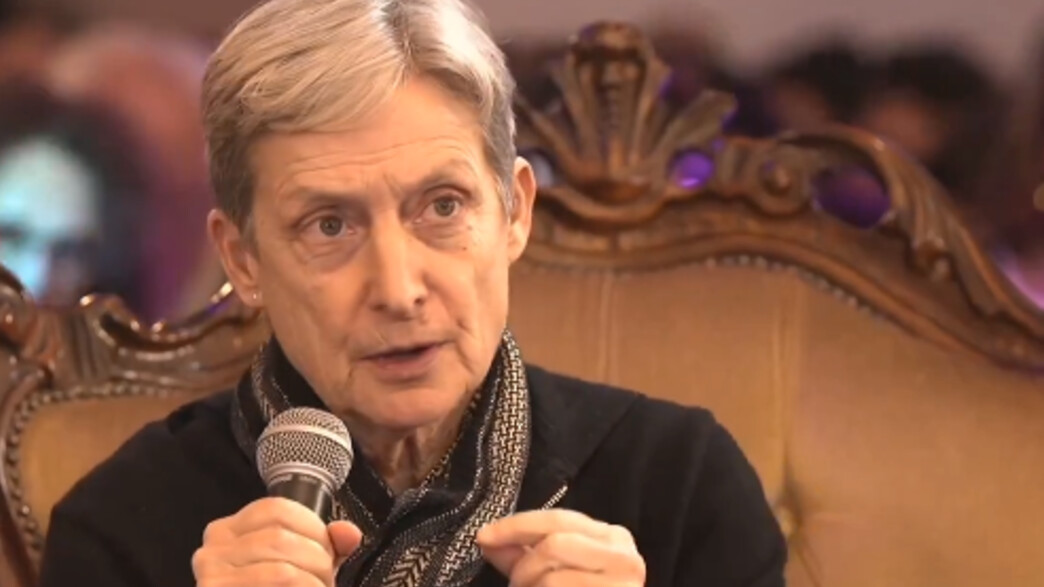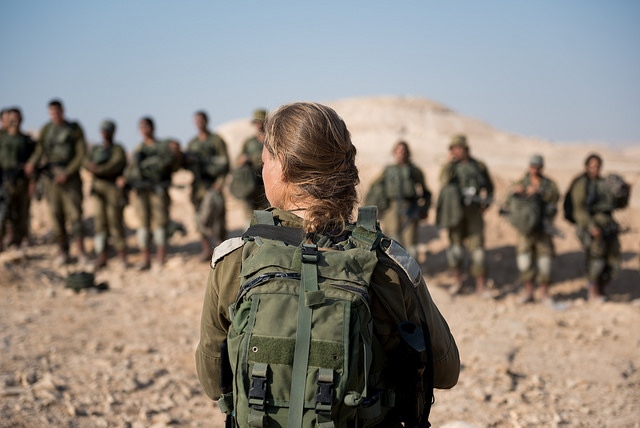Co-writing by: Avekylesh Kolch, Karin Shaaltiel, Noa Burstein-Hadad
Translation: Betty Orshlimi
A week ago we published an article about evacuees in hotels at the Dead Sea. The first days of the evacuation were disordered, and the many volunteers who came to help the evacuees from the kibbutzim asked us to tell our readers that the people who now need assistance are the second round of evacuees, those who came from the towns. This week we visited again
We began our visit at the Royal Hotel, which, in a special evacuation that was strikingly missing last week, is hosting elderly people from the town of Sderot. Improvements are obvious everywhere: from the lunches that were organized for the evacuees (which they were previously not eligible to receive), through tables set up by the Homeland Security Office and civilian “war rooms”; to hotel facilities adapted for use by the evacuees (which were closed last week), and up to the volunteers who treated the elderly with great kindness and offered emotional therapy, physical treatments (a clinic was set up on the top floor of the hotel, open every day), and even massages
The turmoil, disorganization and confusion that we found last week have been replace by relative quiet, which points to a new routine which the elders of Sderot must adopt until an unknown future date. The stories told by the survivors are hair-raising. Some of them describe the battles that occurred that Saturday morning, while others focus on the loneliness they have to deal with, away from their home and families, and the need, in their old age, to contend with war
Walk In Safety
Pull up a chair and sit down, I want to tell you my story,” calls Yaffa Ohana. She is sitting at the entrance to the hotel with her friends, and intently studying the passers-by. She arrived at the Dead Sea a week ago, after she was trapped in the reinforced room of her home for over 12 hours. Ohana has lived in Sderot for almost 40 years. “I’m telling you my story as part of my therapy,” she begins
I woke up at 6:30 and was getting ready to go to the synagogue, which is about 100 meters from my home. The Kassam missiles started, and at the same time, I started hearing a noise like gunshots, but strange. Apparently, that’s the sound of a gun silencer. I looked out my window and I saw eight terrorists, in uniform and with ribbons around their heads, yelling, “Kill the Jews” and “Allah Akbar”. I called out to my son Yakov, who thought I was crazy, and then he saw it, too. We yelled to the people leaving the synagogue to be careful and run home – and we went into our reinforced room. When I called the police, the on-duty officer didn’t understand what I was talking about. She thought it was a prank
Ohana stayed with her son in the reinforced room all that day and night. In the morning she travelled to Yerucham, to a unit her daughter had found for her. When she heard they were evacuating the elderly from Sderot, she decided to join and found herself here at the Dead Sea. In the meantime, her son Yakov has been drafted into the reserves. “We had nothing here. Good people helped us. There are many people here, each kinder than the next. We are an amazing people. They warm our hearts, but we’re terribly traumatized. I wake up in the morning crying and find myself crying all day”, Yaffa shares her mental state with us. “I’m trying not to listen to the news, not to read in Facebook, not to keep abreast. I talk to a psychiatrist twice a day, and that’s what he suggested. But the people around me talk all the time, and there is a lot of fear – about more terrorists, people taking photos of houses, it’s all really frightening. I want to go home, but it’s hard to believe I’ll feel secure walking around in Sderot, that I’ll feel safe going to the grocery store, even within my own home,” she concludes
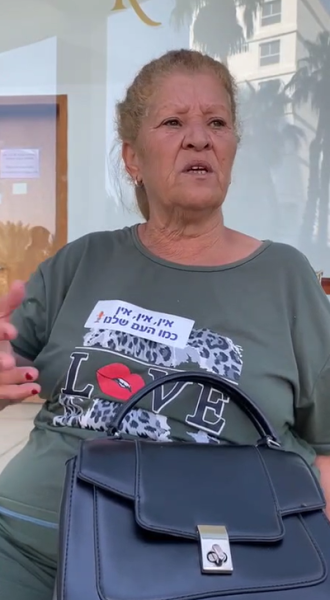
They Just Wanted to Take a Trip
Tatiana came to Israel from Russia in the 1990’s and has been living in Sderot for more than 30 years. She arrived at the Dead Sea, together with her husband, after she lost her good friend Zina, who was murdered while waiting at a bus stop for a trip to the Dead Sea. “We were also supposed to join that trip”, Tatiana says, “But we decided to postpone it to the following week.” One way or another the couple finds itself at the Dead Sea, under completely different circumstances
“The attack on the city began at 6:30,” she says. “We saw it all from our front yard – the terrorists, the police chasing them, how the terrorists hid out in the Rami Levy supermarket which was next to the taxi station where Zina met her death
From that moment on, they hid in their reinforced room and only came out the following day. On Sunday, Tatiana’s husband had planned to go to work, but Tatiana stopped him. “We’re okay now,” Tatiana emphasizes. “We just pray that our soldiers will return alive and well … that we’ll all live in peace
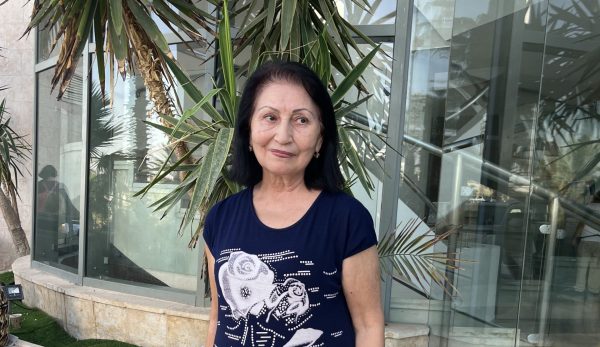
The battle in Sderot went on for two days, at the height of which the terrorists barricaded themselves in the Sderot police station. Over 30 civilians were murdered that day, with incessant rocket fire. Eduardo, an 87-year old immigrant from Russia, has been in the hotel for five days. He left Sderot hurriedly, without taking his wallet. “I don’t have anything here other than my identification card”, he says. “I can’t even buy cigarettes.” His son, a member of the Sderot police, miraculously survived the battle that day. “All of his friends were murdered,” he says
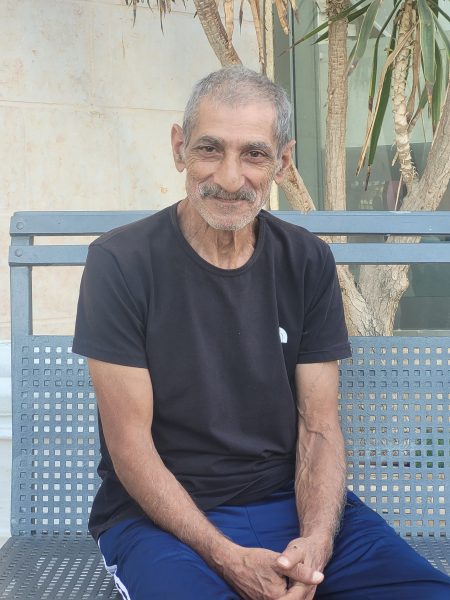
That’s Life in Sderot
Most of the elderly arrived at the Royal Hotel a week and a half ago, when it was decided to evacuate Sderot, starting with the oldest. Besides the emotional trauma after the harrowing events of Saturday, the elderly have additional hardships in times of war: A change in their routine, having to leave their homes, etc. The elderly population of Sderot, whom we met at the Dead Sea, are thirsty for conversation. Even in normal times, loneliness is one of the great challenges facing the older population. In wartime, fear and uncertainty make it even harder to bear: Far from their homes, their families, their children, their friends and their familiar community
Adela, 71, immigrated to Jerusalem from Romania when she was 12 years old. After meeting her husband in 1970, she moved to Sderot. Eighteen years ago, her daughter was killed by a fragment of a rocket that landed in Sderot. Her husband passed away a few years ago, and her two sons left home after they got married. She’s at the Royal Hotel alone. “Shirel, my daughter, was killed 18 years ago. She didn’t even make it to age 30. That’s life in Sderot. My sister also moved to Sderot a few years ago, and a rocket blew her home through a window. Last week we were together in a hotel in Tel-Aviv, this week I moved here. My friends went one way, I went the other, I’m here on my own. If I were still in Sderot, I’d go to the market, meet friends, but here I have nothing to do, it’s boring to be alone. Most of the old people here sit in groups of people they know, or divide up according to place of origin, and I can’t find my place here
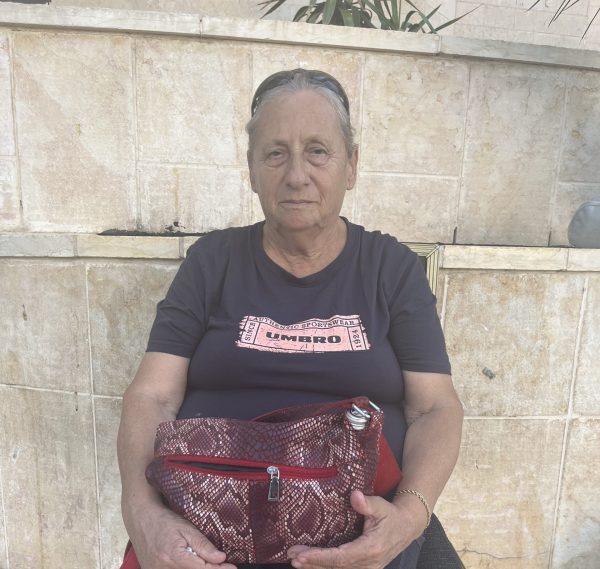
On the other side of the hotel, in what looks like an ad hoc smoking area, Yakov is sitting and watching videos on his phone. “I was preparing to go to the synagogue that morning,” he tells us, “but on the way friends told me that there were terrorists, there were barely five people in the synagogue, so I went home and entered the reinforced room. Throughout the day, I went in and out of the reinforced room … I didn’t know what was happening outside. My phone is closed on Shabbat, a lot of people called me but I only turned my phone on Saturday night and found out what had happened
About 10% of the residents of Sderot are still in the town, despite the evacuation offered by the government “It’s been dangerous to live in Sderot for over 20 years”, says Yakov. “There’s nothing new. The Kassams are in our blood. But for too many years we thought they were stupid, and they’re definitely not. They put one over on us
Yakov continues and says that the hotel is taking care of all of his needs. “We thought we were coming for three days, but I’ve been here for over two weeks. I launder my own shirts, all I asked for was laundry detergent.” A short time afterwards, a truck pulled into the parking lot with multiple washing machines that were purchased by volunteers for the evacuees
“They’re taking care of everything for us,” he says. “I also didn’t bring my car; if I had, I would have returned home to Sderot a long time ago, to my home and my friends. Our pain is everyone’s pain. So many people were murdered. I’m so sad about the kibbutzim, I’m sad about all of us”, he concludes
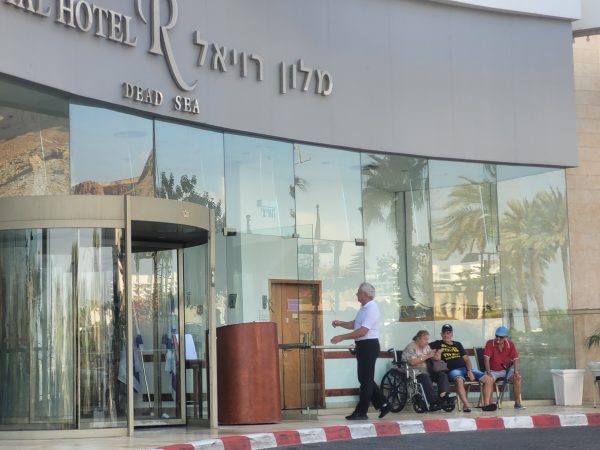
The Ein Gedi Scenery
We leave the Royal Hotel and head for the shopping center with clothes we’ve collected, and bring them to the (free) secondhand store that was opened for the evacuees. The center is full of people, some making purchases, while others sit in the entrance and watch a show that’s just begun. The store is full of buyers and the clothes we’ve brought are happily accepted. From there we head north, to the Ein Gedi Kibbutz hotel. It’s a pastoral ride, and for a moment we forget the war, instead remembering another war, the war for the amazing natural resource called the Dead Sea
Angry at its precarious state, the obvious fact that it’s drying up. Angry at the Ofer brothers, who were given ownership of a resource that belongs to all of us. Maybe that will also change after the way … maybe some things will never change
The isolated Ein Gedi kibbutz, facing the northern part of the Dead Sea, is throbbing with people. On the central lawn is a show for the entire family, at the entrance to the auditorium tens of volunteers are offering a variety of activities to the evacuees, and in different rooms at the side, a creativity area has been set up for children and adults. The kibbutz has accepted people from a variety of places: Sderot, Netivot, Ofakim, Kibbutz Be’eri
I came to Ein Gedi from Kibbutz Be’eri with Rivka, my employer. I’m her caretaker, but now we’re taking care of each other.” This is told to us by Maya, a 42-year old caretaker who’s been working in Be’eri for about a year. We meet her on a bench overlooking the sea. Rivka’s family has come to visit her and Maya uses this opportunity to try and process the recent events
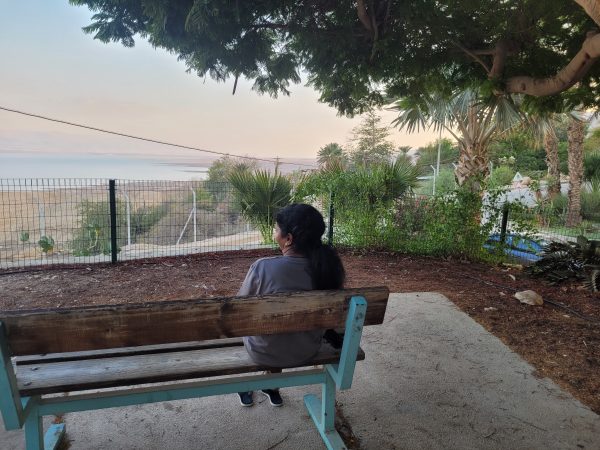
I woke up at 6:00 am, I heard gunshots and I didn’t know what to do. Rivka’s children asked us to go into the reinforced room, we stayed there a long time. We shared a banana and a cup of coffee, and we waited until night. At 11:00 pm people came and knocked on the door of the reinforced room. I had been holding the door handle the whole time. We didn’t know if they were terrorists or Israeli soldiers. We kept hearing shots outside. In the end they managed to open the door. I didn’t feel anything. I didn’t know what was happening. I didn’t know who the people were who were pointing a gun at my chest. But Rivka hugged them. I understood they were on our side.” Maya stops and her gaze drifts back to the water
They asked us to take Rivka’s medicine and our phones and to come with them. It was dark, we couldn’t see what was going on around us and we didn’t know what had happened to Rivka’s children. Yesterday they notified us that their bodies had been identified. She lost both of her sons, the wife of one of them and two grandchildren. My family saw what was happening on TV and was very worried. I have two children in Kochi, India – a 16-year old daughter and a 13-year old son. I was so happy to call them and tell them I’m okay.”
Together, At Any Cost
The soldiers brought us here, to Ein Gedi”, Maya answers our question about how they arrived. “Some of the elderly were moved to Dead Sea hotels, together with their caretakers, my friends. But Rivka wanted to stay here, because the kibbutz is more similar to our home. The volunteers here take care of our every need, they even found a therapist who speaks my language
We ask her about the foreseeable future, does she want to stay in Israel? Go back to the kibbutz? “I want to go back to Be’eri”, she says. “But I’m afraid. I don’t know what’s to become of us. Rivka is okay sometimes, and sometimes not. I asked her not to look at Facebook and not to listen to the news, in order to protect herself. She’s a strong, wise woman. Now she’s taking care of me
Sixty seven year old Nanu also arrived at Ein Gedi by chance. Nanu immigrated from Ethiopia in 1981 and has lived in Sderot ever since. She was given the choice to evacuate with the elderly citizens of the town, but she insisted on staying with her children. Therefore, she was only evacuated a week and a half into the war. “I decided to stay with my children, even if that meant being in Sderot with the Kassam rockets
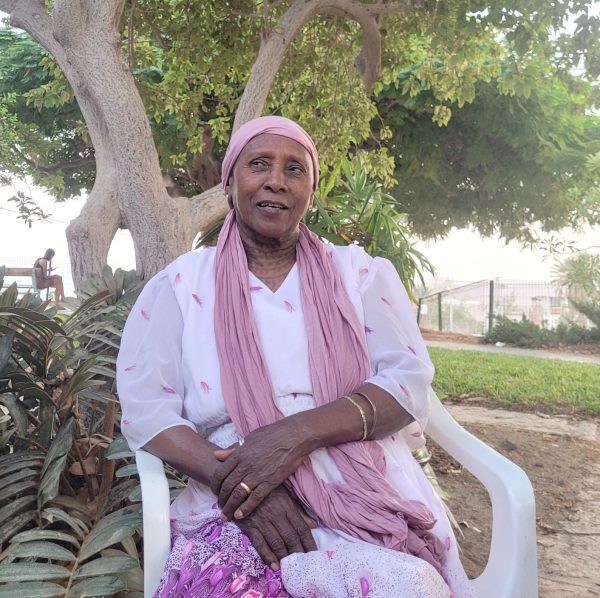
Nanu and her family were far from the centers of the fighting with the terrorists, but the intensity of the rockets and a stay of almost a week and a half in the reinforced room have left their mark. Nanu tells us that now, in peaceful Ein Gedi, she still hears the sirens and the noise of the missile explosions, which have become the dominant sound in Sderot. She, like others, feels it important to stress that she wants to return to her home, but she is also grateful for the extensive aid and support that she’s receiving from the volunteers
“I miss my home, my friends, my neighbors, the senior citizens club. But we’re living peacefully and well, nothing to complain about. They’re taking care of our every need.” Nanu asks to end our conversation with a blessing: “May the soldiers return home happy and healthy, and may the hostages return to their families

